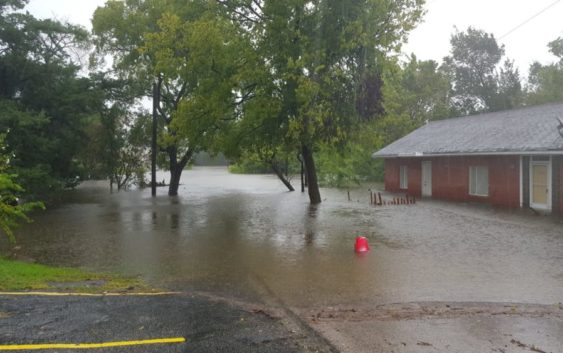- Here’s how Austin-area leaders are preparing for wildfire threats this summer
- Harris County sues Trump administration, cites threat to hurricane season preparedness
- Prescribed burn in Morrow Mountain aims to prevent future wildfires
- Prescribed burns aim to prevent wildfires in Stanly County
- Prepare for hurricane season with the Town of Leland Hurricane Expo
Flooding, pollution more likely to occur in Houston minority communities

A new study found that Houston’s minority communities will likely face more flooding and industrial pollution over the next three decades compared to other parts of the area.
Areas such as East and South Houston, the Second Ward and Magnolia Park are particularly vulnerable. These communities are subject to a one-two punch of flooding and pollution, caused by the mixing of land-based contamination and floodwaters.
Rice University professor and chair of sociology Jim Elliott spoke to Houston Matters on Thursday about his work on the study, which was developed by researchers from Rice University, New York University, and Brown University.
“One of the things that a lot of Houstonians and Americans don’t realize is that while we have a lot of air pollution that’s contributed to climate change in the past as well as the present, we have billions of pounds of industrial pollution that’s been buried in-site,” Elliott said.
He said the study was an effort to understand how past industrial pollution still in the land is subject to new industrial pollution ramifications.
The study involved using historical directories to locate likely sites of “ghost pollution,” which is pollution still in the land that was never regulated or investigated. They combined the ghost pollution statistics with future flood risk data.
“When we merged those data together with census data we were able to sort of pinpoint the social characteristics of different neighborhoods,” Elliott said.
The study found that in Harris County, at least 35,000 people face direct exposure because they live in flood-prone areas. Due to “historical forces” such as Jim Crow laws and discriminatory redlining, these areas are home to lower-income individuals living in multi-unit housing, according to the study.
Elliott said Houston-area leaders should initiate more mitigation tactics, such as cleaning up the communities where flooding is likely to take place.
“This is not a Houston issue, it’s an issue that’s prevalent across the country. That’s what the research is showing,” Elliott said. “So Houston can really be a leader in developing new mitigation strategies and identifying how we might go forward with community engagement.”